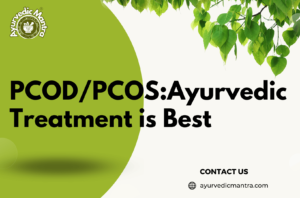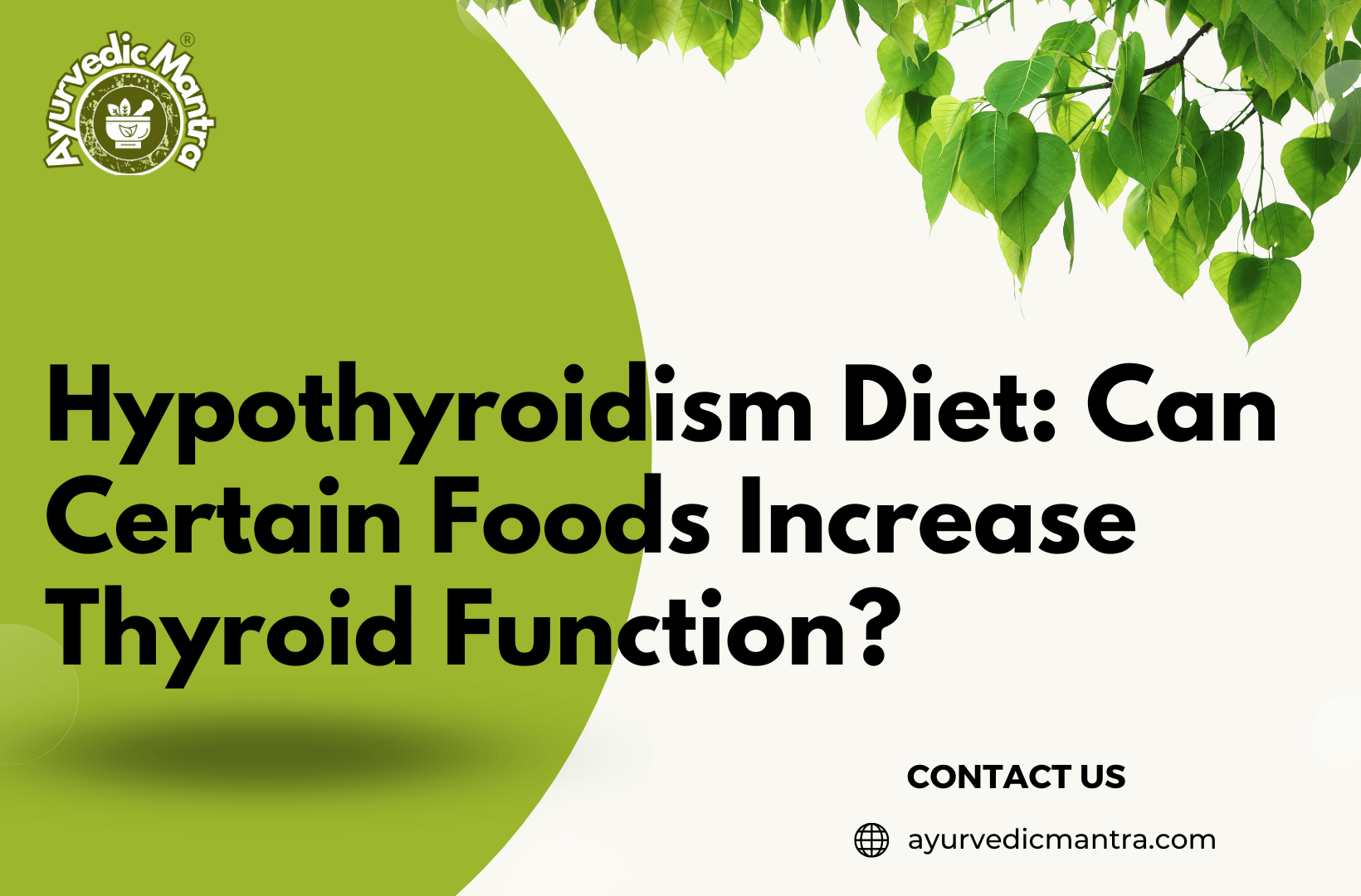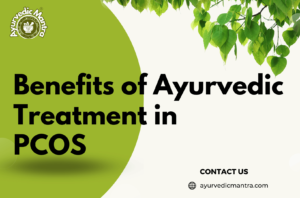
PCOD/PCOS: Ayurvedic Treatment is Best
Introduction Polycystic Ovary Disorder (PCOD) or Polycystic Ovary Syndrome (PCOS) is a common endocrine disorder affecting millions of women worldwide. It leads to hormonal imbalances,

Hypothyroidism, a condition where the thyroid gland does not produce enough thyroid hormones, can lead to various health issues. One of the most common questions among individuals with hypothyroidism is whether certain foods can help increase thyroid function naturally. This article will explore the relationship between diet and hypothyroidism, examining foods that may positively impact thyroid health.
Before delving into the impact of diet on hypothyroidism, it is essential to understand the condition. The thyroid gland in the neck produces hormones responsible for regulating metabolism, energy levels, and body temperature. Hypothyroidism occurs when the thyroid gland fails to produce adequate hormones, leading to fatigue, weight gain, sensitivity to colds, and other symptoms.
While diet alone cannot cure hypothyroidism, certain nutrients can support thyroid function and improve overall well-being. Adopting a balanced and nutrient-rich diet to optimize thyroid health is crucial. Here are some essential nutrients and foods that may aid in increasing thyroid function:
Iodine is a vital mineral required for the production of thyroid hormones. Including iodine-rich foods in your diet can be beneficial for individuals with hypothyroidism. Foods like seaweed, iodized salt, fish, and dairy products are excellent sources of iodine. However, consuming iodine in moderation is essential, as excessive intake may have adverse effects.
Selenium is another essential mineral that plays a crucial role in thyroid health. It helps convert inactive thyroid hormone T4 to its active form T3. Brazil nuts, sunflower seeds, tuna, and eggs are some selenium-rich foods that can be incorporated into the diet.
Zinc is necessary for adequately functioning enzymes involved in thyroid hormone metabolism. Including zinc-rich foods like legumes, nuts, seeds, and whole grains may support thyroid health.
Omega-3 fatty acids have anti-inflammatory properties and may help reduce inflammation in the thyroid gland. Foods such as fatty fish (salmon, mackerel), flaxseeds, and walnuts are excellent sources of omega-3 fatty acids.
Chronic inflammation is often associated with hypothyroidism. Antioxidants can help combat inflammation and oxidative stress. Colourful fruits and vegetables, such as berries, spinach, and sweet potatoes, are antioxidants and can benefit thyroid health.
Some individuals with hypothyroidism may benefit from following a gluten-free diet. Research suggests a link between autoimmune thyroid conditions and gluten sensitivity. Therefore, eliminating gluten from the diet may improve thyroid function for those with both hypothyroidism and gluten intolerance.
Cruciferous vegetables like broccoli, cauliflower, and cabbage contain goitrogens, naturally occurring substances that can interfere with thyroid hormone production. However, cooking these vegetables can reduce the goitrogenic effect, making them safe to consume in moderation.
Protein is essential for various bodily functions, including producing and transporting thyroid hormones. Incorporate lean protein sources like poultry, fish, tofu, and beans into your diet to support thyroid health.
Vitamin D deficiency has been associated with autoimmune thyroid conditions. Spending time outdoors and consuming vitamin D-rich foods like fatty fish, fortified dairy products, and mushrooms can help maintain adequate vitamin D levels.
Staying hydrated is crucial for overall health, including thyroid function. Drink adequate water daily to support your body’s various metabolic processes.
While a specific “hypothyroidism diet” cannot cure the condition, incorporating certain foods and nutrients into your daily meals can support thyroid function and overall well-being. Remember to consult with a healthcare professional or a registered dietitian before making significant dietary changes, especially if you have existing health conditions or are taking medications. A balanced and nutrient-rich diet, combined with medical treatment, can play a vital role in managing hypothyroidism effectively.
While diet supports thyroid health, it cannot cure hypothyroidism entirely. Hypothyroidism is a medical condition caused by an underactive thyroid gland, and its treatment often involves medication prescribed by a healthcare professional. However, a balanced and nutrient-rich diet can complement medical treatment and improve overall well-being.
Iodine is a vital mineral required for the production of thyroid hormones. Including iodine-rich foods in your diet can benefit individuals with hypothyroidism as it supports the thyroid gland’s function. Foods like seaweed, iodized salt, fish, and dairy products are excellent sources of iodine. However, consuming iodine in moderation is essential, as excessive intake may have adverse effects.
Selenium is an essential mineral that plays a crucial role in thyroid function. It helps convert the inactive thyroid hormone T4 to its active form, T3. Including selenium-rich foods, such as Brazil nuts, sunflower seeds, tuna, and eggs, can support thyroid health and hormone conversion.
Following a gluten-free diet may benefit some individuals with hypothyroidism and gluten intolerance. Research suggests a link between autoimmune thyroid conditions and gluten sensitivity. Eliminating gluten from the diet may help improve thyroid function and reduce inflammation in specific individuals.
Cruciferous vegetables like broccoli, cauliflower, and cabbage contain goitrogens, which can interfere with thyroid hormone production. However, cooking these vegetables can reduce their goitrogenic effect, making them safe to consume in moderation for individuals with hypothyroidism.
Omega-3 fatty acids have anti-inflammatory properties and may help reduce inflammation in the thyroid gland. Consuming omega-3-rich foods like fatty fish (salmon, mackerel), flaxseeds, and walnuts can support thyroid health and overall well-being.
Zinc is necessary for adequately functioning enzymes involved in thyroid hormone metabolism. Including zinc-rich foods like legumes, nuts, seeds, and whole grains can support thyroid health and hormone synthesis.
Staying hydrated is essential for overall health, including thyroid function. Adequate water intake supports various metabolic processes in the body, including producing and regulating thyroid hormones.
Vitamin D deficiency has been associated with autoimmune thyroid conditions. Spending time outdoors and consuming vitamin D-rich foods like fatty fish, fortified dairy products, and mushrooms can help maintain adequate vitamin D levels, positively impacting thyroid health.
No, a hypothyroidism diet cannot replace medical treatment. It is essential to follow the advice and treatment plan a healthcare professional prescribes. A balanced diet and medical treatment can be a valuable aspect of managing hypothyroidism and supporting overall health. Always consult a healthcare professional before making significant dietary changes or if you have existing health conditions or are taking medications.

Introduction Polycystic Ovary Disorder (PCOD) or Polycystic Ovary Syndrome (PCOS) is a common endocrine disorder affecting millions of women worldwide. It leads to hormonal imbalances,

Introduction Losing weight is a journey that requires dedication, consistency, and self-care. While there are numerous weight loss techniques out there, not all of them

Polycystic Ovary Syndrome (PCOS) is a hormonal disorder that affects millions of women worldwide. It can lead to various health complications, such as irregular periods,

In recent years, Ayurveda, an ancient system of natural healing originating from India, has gained significant popularity as an alternative approach to treating various health

आजकल वजन बढ़ने और चर्बी की वृद्धि होने की समस्या एक आम समस्या बन गई है। बढ़ते वजन और अतिरिक्त चर्बी के कारण न केवल

प्रस्तावना: आजकल वजन बढ़ने और ओबेसिटी की समस्या एक आम समस्या बन गई है। बढ़ते वजन के कारण न केवल शारीरिक समस्याएं होती हैं, बल्कि
